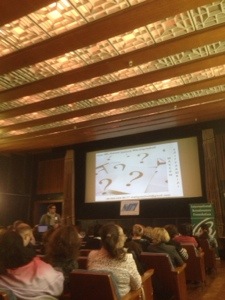 I will defend my PhD at the Faculty of Behavioural Sciences on April 29, 2011. What will I defend then? I think there are some important thoughts that are already presented by other (media) educationalists, too. Here are my ideas about these issues.
I will defend my PhD at the Faculty of Behavioural Sciences on April 29, 2011. What will I defend then? I think there are some important thoughts that are already presented by other (media) educationalists, too. Here are my ideas about these issues.
First, the concept of media education should not be confined any longer to ‘learning about media’ only. A wider understanding is needed and other media contextual aspects must be taken into account, too. This relates to the problem of using information and communication technologies (ICTs) in school. This area should not be left to technological examination only. The focus should be in better study processes and people’s non-institutional media use, too.
Second, media literacy is not just measurable knowledge and skills that can be acquired in institutional settings of education. With the current social media scene, media literacy is most of all about attitude, sometimes critical, towards learning and experiencing the world with and through media. Media literacy should be seen as a process of active involvement with a volition to produce, construct, share and categorize knowledge, opinions and experiences.
Third, media educational situations in school are manifold. A student is using his cell phone during the lesson and what is teacher saying to that? What if the student was using it for his learning task? It is important to gain a wider insight into the levels and aspects that are involved in suddenly emerging but typical situations that involve media educational aspects. It is crucial to understand the complexity of the circumstances as well as teachers’ thinking and reasoning involved media educational situations. This is, what I would call, Episodic Media Education. It can be seen in every situation where media content or tools are present.
The place for the public examination is Psykologia Sali 1, Siltavuorenpenger 1A. PhD summary will be published in ethesis.helsinki.fi. The PhD articles are:
Vesterinen, O., Vahtivuori-Hänninen, S., Oksanen, U., Uusitalo, A., & Kynäslahti, H. (2006). Mediakasvatus median ja kasvatuksen alueena: Deskriptiivisen mediakasvatuksen ja didaktiikan näkökulmia. Kasvatus, 37(2), 148–161.
Kynäslahti, H., Vesterinen, O., Lipponen, L., Vahtivuori-Hänninen, S., & Tella, S. (2008). Towards Volitional Media Literacy through Web 2.0. Educational Technology, 48(5), 3–9.
Vesterinen, O., Toom, A., & Patrikainen, S. (2010). The stimulated recall method and ICTs in research on the reasoning of teachers. International Journal of Research and Method in Education, 33(2), 183–197.
http://dx.doi.org/10.1080/1743727X.2010.484605
Vesterinen, O, Kynäslahti, H., & Tella, S. (2010). Media educational situations and two primary school teachers’ practical reasoning. International Journal of Learning and Media, 2(2–3), 123–139.
http://dx.doi.org/10.1162/ijlm_a_00047

 I will defend my PhD at the Faculty of Behavioural Sciences on April 29, 2011. What will I defend then? I think there are some important thoughts that are already presented by other (media) educationalists, too. Here are my ideas about these issues.
I will defend my PhD at the Faculty of Behavioural Sciences on April 29, 2011. What will I defend then? I think there are some important thoughts that are already presented by other (media) educationalists, too. Here are my ideas about these issues.



